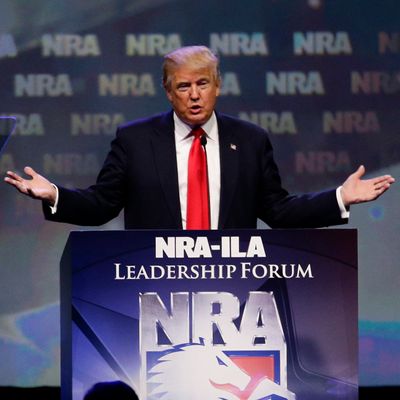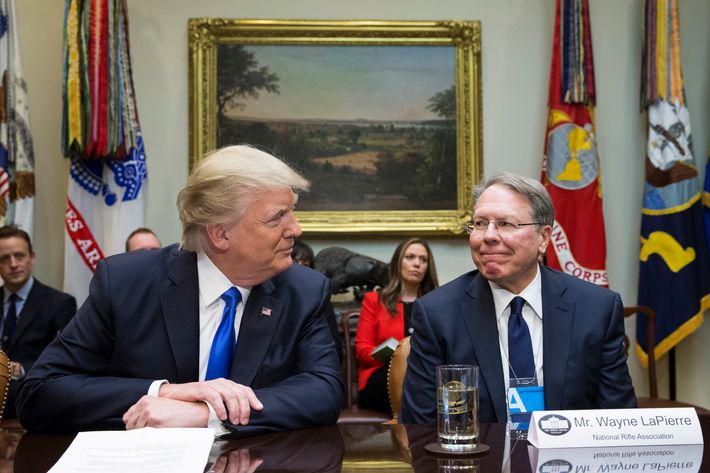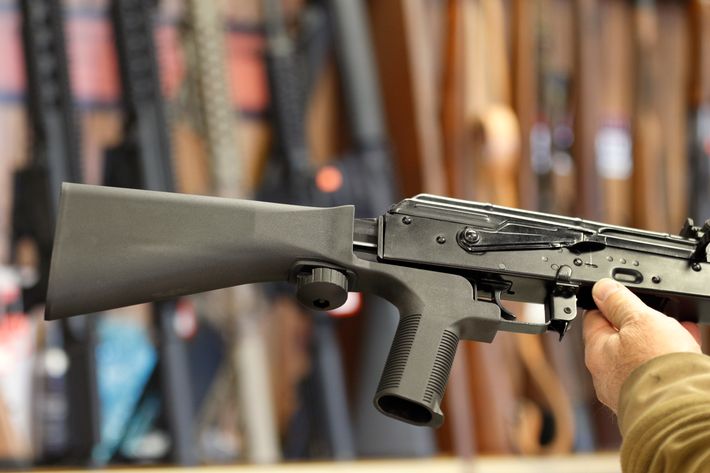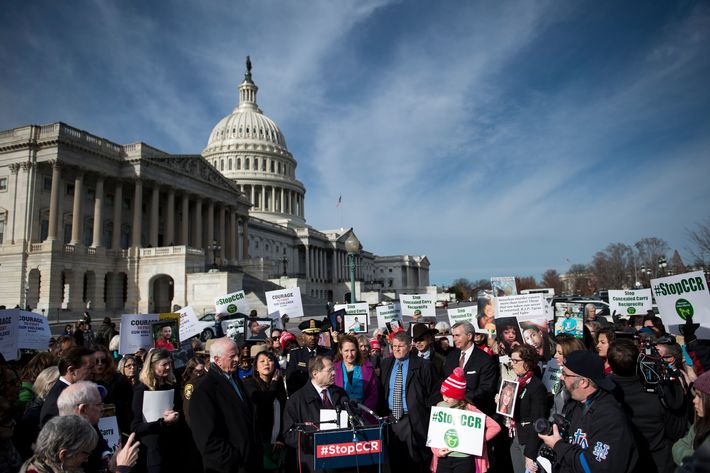
A short time after 17 people were killed in a shooting at a Parkland, Florida, high school on Wednesday, Florida senator Marco Rubio said he hoped the people already talking about gun control would “reserve judgment.”
The Florida massacre was the 18th school shooting in 2018, and at least the 273rd school shooting since 20 first-graders and six adults were slaughtered in Newtown, Connecticut. After that tragedy, Rubio tweeted that he was praying for Newtown, and there would be “plenty of time for policy debate later.”
Like many of his GOP colleagues, Rubio has repeatedly tweeted that his thoughts are with the latest mass-shooting victims, yet somehow it’s never the right time to dig in on the underlying causes. In the past year Democrats have introduced more than 30 pieces of legislation aimed at combatting gun violence, and only four have had GOP sponsors, according to the Washington Post.
That isn’t to say that Republicans have been inactive on gun-related issues. Since President Trump took office, he and other Republicans have launched several efforts to loosen gun-control laws. There are also a handful of GOP lawmakers who expressed interest in fixing the gaps in existing laws that appeared to play a role in recent mass shootings — yet so far, nothing has come of those efforts. Here’s what Washington has been up to.
Trump Blocked a Rule That Made It Harder for the Mentally Ill to Obtain Guns
In December 2016, the Obama administration finalized a rule that would have added people receiving Social Security checks for mental illnesses and deemed unfit to handle their own finances to the FBI’s National Instant Criminal Background Check System (NICS). The rule was written in response to the massacre in Newtown and the Obama administration predicted it would have added 75,000 people to the national database.
Both the NRA and the ACLU said the law violated the Second Amendment rights of the mentally ill without due process, and Congress quickly voted to overturn the rule, mostly on party lines. President Trump signed the measure into law in February 2017, with no public signing ceremony. Since then Trump has continued to say mass shootings are a “mental-health problem,” not a gun problem.

Trump Made It Easier for “Fugitives” to Buy Guns
The 1993 Brady Act, which mandated federal background checks on gun purchases, says that gun dealers can’t complete the sale if the prospective buyer is a “fugitive from justice.” Since 1998, the background-check system issued 180,000 denials for that reason. For years the FBI argued that this restriction applied to anyone with an outstanding arrest warrant, while the Bureau of Alcohol, Tobacco, Firearms, and Explosives said it only applies to people with outstanding warrants who have fled across state lines to avoid prosecution.
In February 2017, Trump’s Justice Department sided with the ATF and purged about 500,000 people previously labeled “fugitives” from the system. In October, the Atlanta Journal-Constitution reported that there had already been an 80 percent decline in the number of gun sales denied to “fugitives,” compared to the previous year:
Nationwide, there were 1,581 gun sales or carry permits sought by fugitives that were declined between March and August in 2016; 18 percent of all denials. This year, there were 321 denials based on entries in the “fugitive from justice” category in NICS, or 4 percent of all denials nationwide.
GOP Moved to Loosen Gun Restrictions on Federal Lands
Carrying loaded firearms on the roughly 12 million acres of federal lands controlled by the Army Corps of Engineers has been banned since the 1970s, with the exception of areas that allow hunting and target shooting. In March the Corps gave notice in a lawsuit over this policy that it is “reconsidering the firearms policy challenged in this case, as well as plaintiffs’ requests for permission to carry firearms on Army Corps property.” The House GOP also tucked a rider that would change the policy into an energy-appropriations bill.
On March 2, his first day in office, Interior Secretary Ryan Zinke revoked a ban on using lead ammunition on wildlife refuges. The Obama administration had implemented the ban two months earlier to prevent plants and animals from being poisoned by lead left on the ground or in their water supply.
Republicans Advanced a Bill to Make It Easier to Buy Gun Silencers
A bill that would loosen restrictions on buying gun silencers, known as the Sportsmen’s Heritage and Recreational Enhancement Act, was originally set to get a hearing on June 14, 2017, but it had to be delayed when a gunman opened fire that morning on members of Congress practicing for a charity baseball game, seriously injuring Majority Whip Steve Scalise and wounding four others. It was marked up by a House committee in late September, but the vote was delayed again after 59 people were fatally shot during a concert in Las Vegas on October 1.
A day later, Politico reported that the vote wasn’t anticipated “anytime soon” — but it’s expected to pass eventually. The bill would also make it more difficult for the ATF to classify ammunition as “armor piercing,” and ease restrictions on the interstate transportation of weapons.

Congress Discussed Banning Bump Stocks, Has Yet to Pass Anything
After a “bump stock,” which makes a legal semiautomatic firearm function like an illegal automatic weapon, was used in the Las Vegas shooting, Democratic senator Dianne Feinstein introduced a bill that would ban the devices. Even a handful of Republicans said they wanted to look into outlawing bump stocks, including Senators Ron Johnson, Lindsey Graham, and John Cornyn. However, many GOP lawmakers backed off after the NRA said their legality should be addressed by the ATF.
In early December, the Senate Judiciary Committee held a hearing on the matter and the ATF initiated a new review of bump stocks. The ATF already told Congress in 2010 and 2013 that it doesn’t have the authority to regulate the devices, and the agency’s acting director warned that they might conclude again that they need guidance from Congress. “It’s hard to believe this is anything other than another way for Republicans to stall congressional action,” Feinstein said.
Rather than waiting for Congress, at least 15 states and other municipalities began considering their own bump-stock restrictions. New Jersey and Massachusetts have already enacted new laws banning bump stocks (which were illegal in New York and California prior to the Las Vegas shooting).
Paul Ryan Ignored Calls to Form a Select Committee on Gun Violence
In the wake of the Las Vegas shooting, Democratic House Minority Leader Nancy Pelosi called on Speaker Paul Ryan to create a Select Committee on Gun Violence that would “study and report back common sense legislation” to stop mass shootings. She also asked him to take up a bipartisan bill that would establish mandatory background checks. Ryan did not respond. Two days after 26 people were killed in a Texas church shooting on November 5, Democrats tried to force a vote to establish a gun-violence select committee, but their effort drew no Republican support.

House Passed Bill Allowing Concealed Carry Across State Lines
The gunman in the Texas church massacre was kicked out of the military for domestic assault, which should have prevented him from purchasing a semiautomatic rifle. But the Air Force later admitted that it failed to submit his records to the federal database.
In response, Senators Chris Murphy, a Democrat, and John Cornyn, a Republican, introduced the Fix NICS Act, which aims to improve the reporting of criminal records and domestic-violence data to the FBI. It seemed like the rare piece of gun legislation that could make it out of both chambers of Congress.
Then it was tacked on to the Concealed Carry Reciprocity Act, which would allow people granted a concealed-carry license in their state to conceal a weapon anywhere in the country, overruling other states’ gun laws. That top NRA legislative priority passed by a vote of 231-198 in December, mostly on partisan lines.
The combined bill is likely DOA in the Senate, where it would need the support of nine Democrats. Murphy and Cornyn are calling for the two bills to be considered separately, but it’s unclear when the bills might get a vote.
Trump Proposed Cutting Millions of Dollars From the Background-Check System
Trump’s fiscal year 2019 budget, which he rolled out two days before the Florida shooting, calls for reducing funding to the National Criminal Records History Improvement Program and the NICS Act Record Improvement Program, which give states federal grants to improve reporting to the national background-check database. Trump proposed cutting their funding from the current $73 million to $61 million, a 16 percent reduction.






























